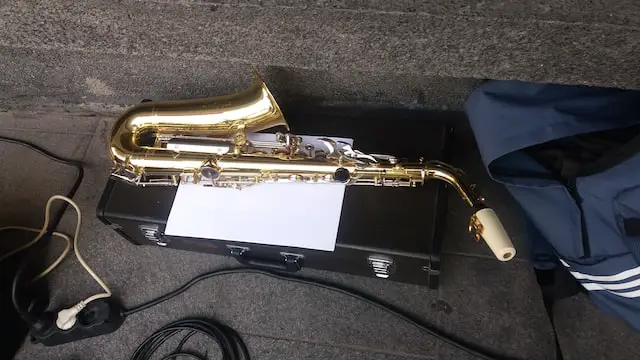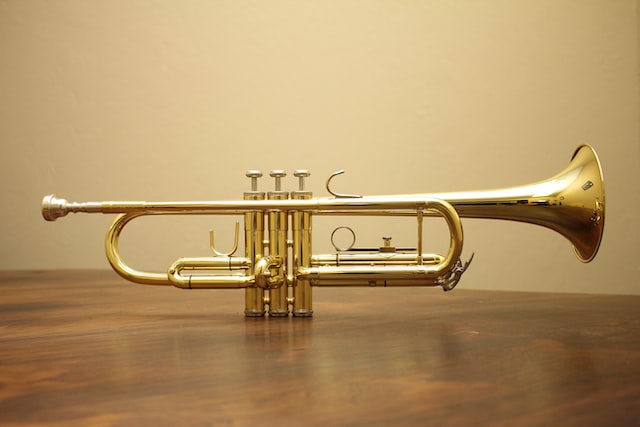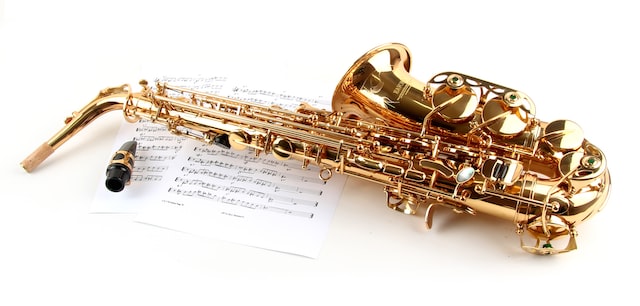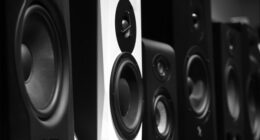The saxophone has a smooth and mellow sound while the trumpet produces bolder sounds with more intensity. Both instruments require different techniques.
Saxophone Vs. Trumpet – Key Difference
The two main types of saxophones are The Alto and The Tenor. There are also baritone, soprano, and bass saxophones. Trumpets come in different sizes too, but the most common ones are The B♭ trumpet and The C trumpet.
Saxophones are generally larger than trumpets. This means that they have a bigger sound and can project their sound further. Saxophones also have a wider range of notes that they can play. Trumpets, on the other hand, can play higher notes more easily than saxophones.
Saxophones use a single reed to produce their sound while trumpets use a cup-shaped mouthpiece. This gives trumpets a brighter sound than saxophones. Saxophones can produce a wider range of tones because of their conical shape while trumpets are more limited in the tones they can create.
Saxophones are considered more versatile than trumpets and can be used in a variety of genres such as jazz, rock, and blues. Trumpets are more commonly used in classical and traditional styles of music.
The different types of saxophones
(Photo by Marija Zaric on Unsplash )

Saxophones come in many different shapes and sizes, each with its own unique sound. The most common types of saxophones are soprano, alto, tenor, and baritone.
Soprano saxophones are the highest-pitched of all the saxophone types. They are small and lightweight, making them easy to carry around. Soprano saxophones produce a bright, cheerful sound that is perfect for upbeat songs.
Alto saxophones are slightly larger than soprano saxophones and have a lower pitch. They produce a rich, mellow sound that is perfect for slow, romantic songs. Alto saxophones are the most popular type of saxophone.
Tenor saxophones are even larger than alto saxophones and have an even lower pitch. They produce a deep, rich sound that is perfect for jazz or blues songs. Tenor saxophones are the second most popular type of saxophone.
Baritone saxophones are the largest type of Saxophone. They have a very low pitch and produce a deep, booming sound that is perfect for rock or metal songs. Baritone Saxophones are the least popular type of Saxophone.
The different types of trumpets
(Photo by Hal Gatewood on Unsplash )

Trumpets come in many different shapes and sizes, each with its own unique sound. The most common type of trumpet is the standard B♭ trumpet, which is what most people think of when they think of a trumpet. Other common types of trumpets include the C trumpet, D trumpet, E♭ trumpet, and F trumpet.
The B trumpet is the most versatile type of trumpet and can be used for a wide range of genres, from jazz to classical. If you’re just starting out,
The C trumpet is a good choice for a beginner because it’s less expensive than other types of trumpets and easier to play.
If you’re looking for a challenge, try The D or E♭ trumpets. These trumpets are harder to play but have a richer sound that’s perfect for soloing.
The F trumpet is the hardest type of trumpet to play but produces a beautiful sound that’s perfect for classical and jazz music.
Which is easier to play saxophone or trumpet?
Some people find that saxophone is easier to play than trumpet, while others find the opposite to be true. There are a few factors that can influence which instrument is easier to play, such as the size of the instrument and the range of notes it can produce.
The saxophone is a larger instrument than the trumpet and has a wider range of notes. This can make it more difficult to control for some players. The trumpet has a more limited range but is smaller and easier to hold. This can make it easier to control for some players.
How long does it take to master sax?
Most experts agree that it takes a considerable amount of time and practice to become proficient at playing the saxophone.
If you are starting from scratch, without any prior musical experience, it could realistically take years of regular practice to reach a level where you can play confidently in front of an audience. Even if you do have some prior experience with another instrument, the saxophone is a notoriously difficult instrument to master due to its intricate fingering and breathing techniques. So don’t be discouraged if it takes longer than you initially expected – just keep practicing and you will eventually get there!
Can you breathe through your nose while playing trumpet?
Noses were made for breathing, so of course you can breathe through your nose while playing trumpet! In fact, many trumpet players find that it helps to breathe through their nose while playing, as it warms and humidifies the air before it reaches the instrument. However, it is important to note that you should not try to force air through your nose if it is blocked; if your nose is congested, it’s best to take a break from playing or use a decongestant spray before attempting to play again.
Why can I not play high on trumpet?
There are a few reasons why someone might have trouble playing high notes on trumpet. First, the Trumpet is a brass instrument and therefore requires the use of vibrating lips (embouchure) to produce sound. It is important that the trumpet player learn how to use their embouchure correctly in order to play in all registers. Second, the trumpet has a very limited range compared to other instruments, such as the saxophone. This means that trumpet players must be extra careful when playing high notes, as they can easily go out of tune. Third, the trumpet is a transposing instrument, which means that the music is written in a different key than what it actually sounds like. For example, if a trumpet player is reading music written in C major, they will actually be playing in B-flat major. This can be confusing for some players and make it difficult to know what note to play when reading sheet music. Finally, many trumpet players find it difficult to play high notes because of the way the instrument is constructed. The Trumpet’s tubing is bent twice (once near the mouthpiece and once at the bell), which can cause some notes to sound flat or sharp when played. These are just a few of the reasons why someone might have trouble playing high notes on trumpet. If you’re having trouble hitting those high notes, make sure you’re using proper technique and take some time to practice!
Frequently asked questions about the saxophone and the trumpet
Which is more expensive saxophone or trumpet?
Generally speaking saxophones are typically more expensive than trumpets. This is due in part to the fact that saxophones are generally considered to be higher-quality instruments than trumpets. Saxophones also tend to last longer than trumpets, which may contribute to their higher price tag.
Can a trumpet player play saxophone?
No, a trumpet player cannot play saxophone. The two instruments are too different. Saxophone is a wind instrument that uses a reed to create sound, while trumpet is a brass instrument that uses the player’s lips to vibrate air through the instrument.
What is the closest instrument to a saxophone?
The closest instrument to a saxophone in terms of sound is the clarinet. Both instruments are made of wood, have a reed, and use a mouthpiece. The main difference between the two is that the saxophone is larger and has a conical bore, while the clarinet has a cylindrical bore. This gives the saxophone a richer, more mellow sound, while the clarinet has a brighter, more piercing sound.
Is saxophone the hardest instrument to play?
Many experts believe that the saxophone is one of the most difficult instruments to play due to its intricate fingering and the need for a great deal of breath control. Trumpet players also need a high level of breath control, but the brass instrument’s simpler fingering makes it easier for some musicians to master.
Does playing trumpet damage your lips?
When it comes to mouthpieces, the trumpet has a much smaller one than the saxophone. This means that players have to use more pressure when playing the trumpet, which can damage their lips.
Do you need strong lungs to play saxophone?
No, you don’t need strong lungs to play saxophone. In fact, many saxophonists have asthma or other respiratory problems and still play well. The saxophone is a wind instrument that uses a reed to produce sound. The reed vibrates when you blow air through it, and the resulting vibrations create the sound of the instrument.
Do you need good lungs to play trumpet?
While both instruments require the player’s lips to vibrate, the trumpet requires much more air flow. This means that players with asthma or other respiratory issues may have difficulty playing the trumpet.
What can you not do with a saxophone?
There are a few things that you cannot do with a saxophone that you can do with a trumpet. For example, you cannot play the saxophone in a marching band because it is too large and cumbersome to carry around. Additionally, you cannot play the saxophone as loud as a trumpet because it does not have the same range.
Featured Image by – Photo by EAVONE Jazzman on Unsplash








